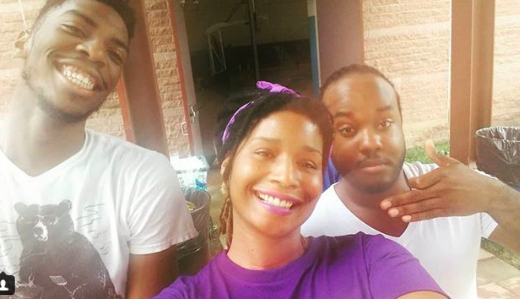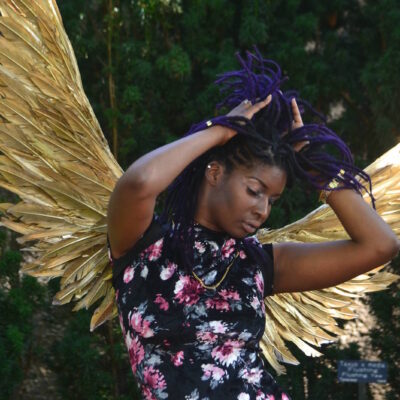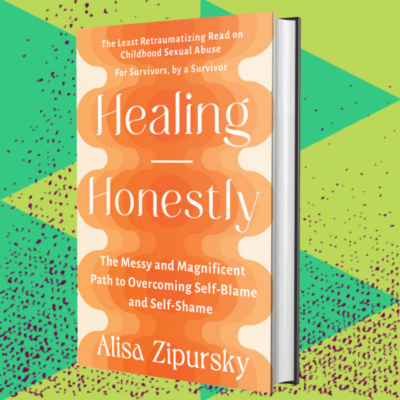This story references Shehariah experiencing intimate partner violence. All descriptions of violence are in the intro paragraph of piece.
I am so glad to introduce you all to Shehariah Johnson.
In 2015, Shehariah Johnson was attacked and stabbed 12 times by an ex-partner. Shehariah was immediately paralyzed from the neck down due to a spinal cord injury called Brown-Sequard Syndrome. At the time, she was 22 years-old. In the past three years, Shehariah has harnessed her resilience and faith to do incredible work both in her native Washington, DC and online to support other survivors while she herself heals from interpersonal violence. Read about why Shehariah decided to focus on creative expression as a tool for healing, her advice for organizing in your own community and what she wishes people understood about being a survivor.
AZ: So happy to be talking about you and your work, Shehariah! Tell us about Silence Kills, the movement you started in 2016.
SJ: I launched Silence Kills shortly after I was released from the hospital, with a vision for survivors to turn our collective pain into power. Silence Kills provides culturally relevant education, resources and community awareness to prevent violence and support survivors. A big part of our movement is encouraging and supporting people to speak the unspoken through artistic expression.
AZ: On this site we talk a lot about how much pressure there is for us to disclose our trauma and how we each need to do what is best for ourselves individually when it comes to whether or not to disclose. What do you mean when you say “Silence Kills”?
SJ: Everyone has their own journey and ways of coping in terms of whether they plan to disclose or not disclose their abuse. I do not judge those that have not or choose to never disclose their stories—everyone definitely has that right. Some people are destined to share their stories, while others may just want to behind closed doors. I encourage people to speak about the unspoken via art because I know that verbally it is very difficult to actually talk about the trauma that you have endured, but that it can be very healing to express ourselves. When I began expressing myself I started to feel my strength and power return to me.
Fostering a sense of resiliency will be instrumental in your healing.
My voice was taken away in my abusive relationship. I was silenced in many ways, including isolation and manipulation. I didn’t talk to my family about the abuse I was enduring as I was enduring it. I had so many different feelings—shame, guilt, shock, pain. Breaking my silence has helped me grow, heal, and learn from what I’ve been through.
AZ: You’ve hosted so many great events that highlight art as a tool in healing, such as your Paint the Unspoken event. Tell us more about these events that harness creative expression to heal.
SJ: The idea behind our Paint the Unspoken and Artistic Expressions eventis that people will have the ability to exist in a community that is conducive to healing and speaking out. We start off with yoga and discussions about specific topics on abuse, and then an art-led session based on topics such as what does it look like to be silenced, etc. Afterwards, we discuss and present what was drawn/painted. The idea is to create a safe space to be able to express pain without verbally speaking on it, unless members feel inclined to speak on it. The floor is always open and respected for anyone who attends.
AZ: You have such a strong and awesome community both online (1,700+ members in the Facebook group alone!) and in DC that you’ve cultivated. It’s clear you’re really meeting a big need. How would you describe what that need is?
SJ: I believe that the biggest need is creating support, community, and free services that allow for freedom in healing and expression. Many organizations and businesses only offer paid services, while many victims and survivors don’t have the financial means to access everything needed for productive healing. Therapy is a prime example, and also the medications that go along with that (whether its medications for the physical result of abuse, or the mental, this is also a hindrance). Many organizations also wait for people to come to them; I want to change that dynamic and go to people, those that need our services the most.
Meet your folks where they are and support them throughout their journeys of healing and self-discovery.
AZ: Do you see yourself and your survivorship being represented in the larger national conversations about sexual violence? Whose voices do you think are being left out of the conversation right now?
SJ: Many voices are being left out of the conversation right now. Male voices are not present enough. Minorities are even more underserved when it comes to abuse and healing practices. Many of us have endured major trauma through the intersectionality of gender, race, poverty, etc. and have a very difficult time even seeking mindfulness practices because many of them are frowned upon based on our upbringing. An example is seeking therapy after enduring trauma. Many of us were taught to leave it in God’s hands and that other sources of healing are ungodly or mean that you do not have faith. This is one of many reasons that people don’t seek therapy.
AZ: What advice would you have for other survivors looking to organize in their own communities to offer collective healing spaces?
SJ: My advice would be to consult and seek out domestic abuse organizations on the state and local level for guidance, resources and also referrals. It is important to have a plan and think about funding for any service that you would like to provide.
AZ: What is one thing you want to communicate to the people who love a survivor?
SJ: Learn and do research about trauma and how it affects us in a variety of ways, including PTSD, and many of the other constant battles that can surface after trauma. Meet your folks where they are and support them throughout their journeys of healing and self-discovery. Listen without judgement and condescension and it will help us to be able to be ourselves within the confines of our new reality.
If someone is still in an abusive relationship never suggest that we should “just leave”. The most lethal time for a victim is when they are leaving or have just left. People stay for a variety of reasons and if you love us it is not your place to judge us. If we want to leave, you can support us by helping us make a plan.

AZ: What is one thing you’d like to say to fellow survivors?
SJ: Things may not get easier, but you will get stronger. Fostering a sense of resiliency will be instrumental in your healing. Affirmations can be powerful, even when you don’t believe them yet. Tell yourself you are worthy of your love. You matter.
To learn more about Shehariah’s work and to connect with her you can find her on Instagram, Twitter, and Facebook. To support Silence Kills you can donate to the start up fund. To see Shehariah’s Spoken Word performances, you can visit her Youtube channel.

